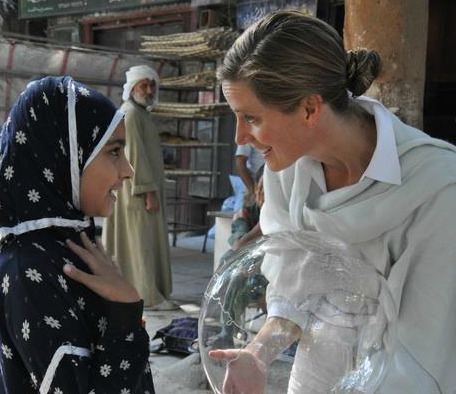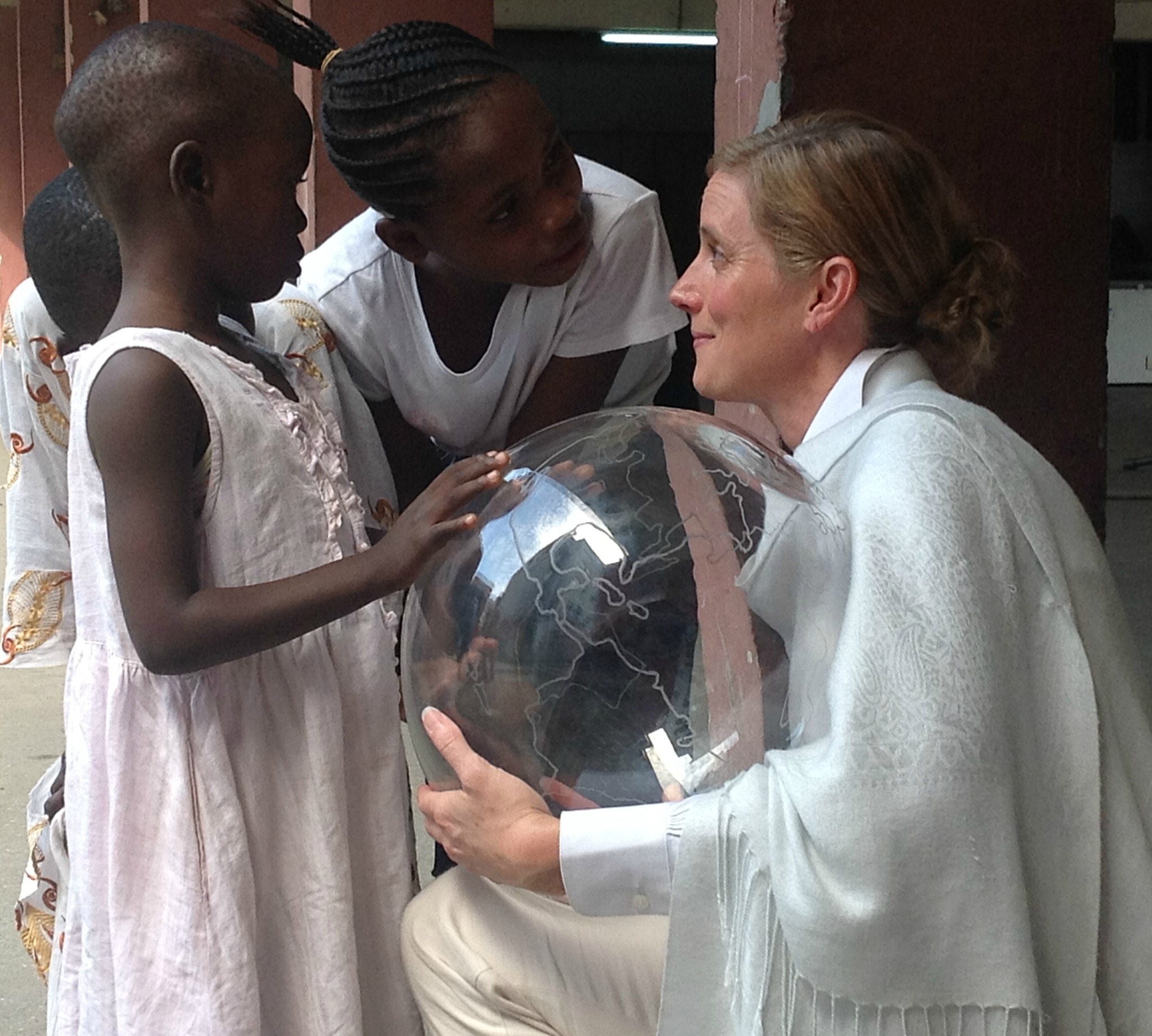
It has been just over a month since the culmination of the One Earth. One Voice. campaign's 99-day trek around the world. The journey, which touched six continents and countless lives, culminated on December 21, 2012 by bringing together voices in over 70 countries worldwide to sing a song in synchrony, in a musical and impassioned call for the healing of the earth. As the progenitor of the campaign, I walked the earth for 99 days, circumnavigating our planet with a 14-inch diameter glass globe in my arms -- a symbol of earth's frailty -- recognizable as such by people of every walk of life, culture and ideological persuasion.
On the one month anniversary, this week, here in the United States, we inaugurated our 44th president to his second term, and with his fateful oath taken, a weary nation and planet lifted its gaze once again.
Against a backdrop of unprecedented economic peril, the disenfranchisement of a beleaguered and disappearing middle class and the ravages of one of the most devastating natural disasters in the nation's history, President Obama gave climate change and its future implications a voice on center stage. "We will respond to the threat of climate change," he said, "knowing that not doing so would be to betray our children and future generations."
We've heard similar strength before, only to have hopes dashed, hearts broken, by unfulfilled -- perhaps unfulfillable -- promises. For all of the progress made in his first term (and there was progress), Obama, in taking on climate change, takes on an entire worldview, a system set up to favor the powerful structures that still derive immense economic benefit from the rapacious plundering of our planet's besieged body. It will take every ounce of political will and moral courage to move a planetary-healing effort forward in a meaningful, trajectory-altering way.
Political will and moral courage alone, however, won't reach the depths of the core issue in a lasting way. At its most essential, this is nothing less than a spiritual referendum on the fate of humanity -- a late-hour bid for a triumphant human narrative in the long-spun story of earth.
What it will take, therefore, is the reclamation of all things genuinely human: the restoration of imagination, ingenuity and creativity to the very center of the dialogue and course of action in moving us successfully through this crisis. It takes scientists to help us understand the issues and what's at stake. It will take every single one of us, aided by our own creative capacity, to move human hearts, to remind ourselves of why the fight for this planet -- and therefore for our own humanity -- matters, not just for us, but for those generations to follow.
During the past month, I have had a chance to reflect on the 99-day journey -- its impact, its implications, where we go from here. I've conferred with our constituents and advisors worldwide, asking the question, "Is there interest in continuing our efforts, in growing what we've started?" The answer, continent by continent, unanimously, has been a resounding yes, while stories continue to pour in from around the world -- villages in Africa, communities in the Pacific Northwest, schools in South America -- letting us know that at the moment our song rose up for the earth, they were with us.
What is it about this movement that has touched the hearts of so many around the world? To a person, I have heard something about the restoration of hope, vision, and yes, the re-engagement of their imagination. This movement, this moment on earth, somehow gave them permission to dare once again to dream and work toward a life on earth that is balanced and healthy for all; a life, in short, beyond this crisis.
Imagination and the Power of Symbol.
Joseph Campbell once described a symbol as "a sign that points past itself to a ground of meaning and being that is one with the consciousness of the beholder." Our glass globe was met with tears by some and surprised laughter by others, but its effect was remarkably universal in every country and culture to which we have traveled. It can best be summed up by the comment made to me on the flight to Cairo in November. I shared a row with a man from the Hausa tribe, a cardiologist from Nigeria. Our globe took the seat between us. He and I laughed as together we wrapped the globe in a blanket and secured the lap belt around her. "We -- you and I -- and all of us (gesturing to our fellow passengers) -- we are all in this together," he said, pointing to the wrapped up globe. "And she is very, very fragile."
Earth's Frailty and the Human Story: A Brief Summary.
As modern, industrialized life evolved, particularly in urban centers of the world, humanity pulled itself farther and farther away from the roots -- literally -- of the sustaining processes of human life. The cadences of nature became an abstraction, muted almost to the point of invisibility by the manufactured "micro-environments" created through intensive industrialization and its economic derivatives.
Yet, in the unbridled enthusiasm of new discovery and technological advances, we -- heirs to Prometheus -- were unable, perhaps unwilling, to see and consider all that the flame of insight revealed. In our selective perception, we failed to recognize the causal link between the illuminative light of those advances and the long shadow they cast, first, upon those fellow human beings who were caught as dehumanized cogs in the massive machines of progress, and second, upon the softer rhythms of the laws of the natural world.
Even with this dire analysis of how we got here, and where we are at present, I remain fiercely hopeful about our species and the future of our planet. The vast scope of technological advances of the last century in particular has taught us something as a species, if we are willing to accept the lesson as well as its implications.
We have learned that there are no limits to our capacities of co-creation. We are a hybrid species, one might say -- part earth, part spirit -- co-conspirators with the cosmos in expressing all that can be manifest in life on earth. It is an immense responsibility, as well as our greatest privilege, particularly as we recognize the frailty of our earth and the degree to which our choices and decisions directly impact the future of life on her body, not just for our species, but for all living creatures.
Nature doesn't shout. She never will. Nature will, however -- and is -- heaving in her utter exhaustion and in an attempt to restore balance to her systems -- to her body. In the end, there is no negotiating with her law. We are either in alignment with it, or we are not. If we choose to stay misaligned, we do so at our own peril. That it is this same law which brought our species into being in the first place only adds to the agonizing poignance of this critical decision-point time in the history of the earth. In short, it is the most fragile time our earth has ever faced, and our species holds the key to its resolution, one way or another. We literally, and figuratively, hold this beautiful, fragile earth in our hands.
Pointing Us Through -- the Power of Human Imagination.
I believe that the environmental crisis and the broader, modernist crisis of existential meaning are derived from the same source of evolutionary thought. In the end, what we are experiencing is at its deepest level a crisis of imagination, struggling with immense fears to let go of the way we have done things on earth until now, to embrace the vast unknown of those new models of living that are the only sustainable ways forward. May the newly reelected president of the United States take heed, take courage and take action. May we courageously raise our own voices as well.
Human imagination and creativity can -- and must -- guide us through these uncharted waters. Fortunately there are many brave voices among us who are already pointing the way. But a crisis of this scale necessitates that all human beings engage in this imaginative process together, in hearts as well as minds, and that every voice and human heart finds its place in the dialogue. It is for this reason I walked the streets, villages, and cities of the earth, glass globe in my arms and a song for the earth in my heart, for 99 days. And I came to learn that in every step along the way, I was not alone.
Onward.

